


Civil Service Newsletter Editorial Board
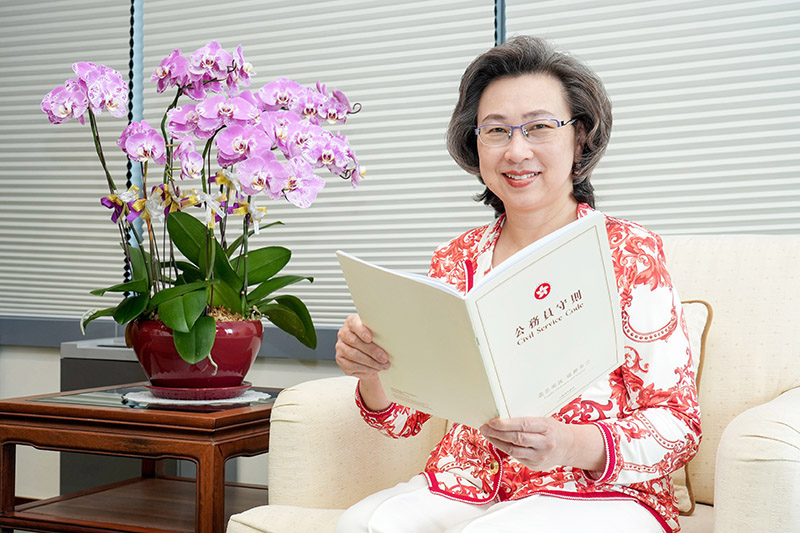
Civil servants are the backbone of the Government and the foundation of effective governance. Since assuming the post of the SCS two years ago, Mrs Yeung has been leading Civil Service Bureau (CSB) to strengthen civil service management. One of the key initiatives is the updating of the Code promulgated in 2009, which serves as an important compass to guide the day-to-day work, decision making and behaviour of all civil servants.
Mrs Yeung said, “To better meet the current needs of society, the Code has been comprehensively updated and enriched with the contents about safeguarding the constitutional order underpinned by the Constitution and the Basic Law, so that the civil servants will better understand their constitutional responsibilities and roles. Following the passage of the Safeguarding National Security Ordinance, we have also set out in the Code the responsibilities that must be adhered to and fulfilled by civil servants under the ordinance.”
Regarding earlier concerns about whether the extent of freedom of speech enjoyed by civil servants would be affected by the updated Code, Mrs Yeung pointed out that civil servants should be mindful of their personal behaviour and conduct. In their capacity as civil servants, they should not criticise any government policies. When expressing their views and taking part in activities in personal capacity, civil servants should avoid their views being mistaken as the Government’s official position or associated with their official capacity. “It does not mean that there is no room for freedom of speech. While freedom of speech enjoyed by individuals is enshrined in the Basic Law, as in other jurisdictions, such freedom is not absolute.” She added that civil servants of some countries are subject to similar requirements on expression of opinions. The higher the rank of a civil servant, the more stringent the requirements are. She reiterated that representatives of staff unions may continue to express views different from those of the Government on issues related to the purposes for which staff unions are established, such as pay, benefits and occupational safety.
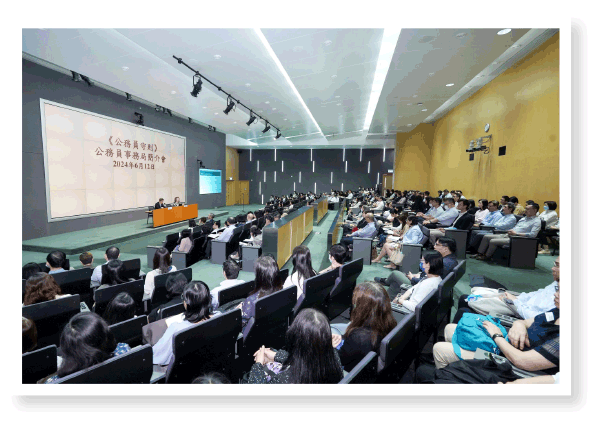
On upcoming work priorities, Mrs Yeung said that the current-term Government attaches great importance to civil service training. Training in national affairs, national security, geopolitics, leadership skills and application of the latest technologies have been enhanced both in terms of quality and quantity.
She said, “In the past, colleagues in general prioritised their work over training. However, training is in fact a kind of ‘reserve capacity’. We should enhance our competencies in various aspects by pursuing continuous learning and acquiring new knowledge. Only by doing so can we keep abreast of the times, and roll out new policies and services that cater flexibly to changes in present-day society. Such policies and services should be devised with people’s needs in mind and in a way truly responsive to people’s needs.”
“Given the need to actively promote the culture of continuous training in the civil service, the management has the responsibility to encourage and arrange for colleagues to participate in training sessions. Colleagues should cherish every training opportunity. They should be as enthusiastic and serious about training as they are about their work, and apply what they have learnt from different domains to their day-to-day duties. The Civil Service College will launch training programmes with different emphasis and themes. We look forward to active participation of our colleagues in the programmes.”
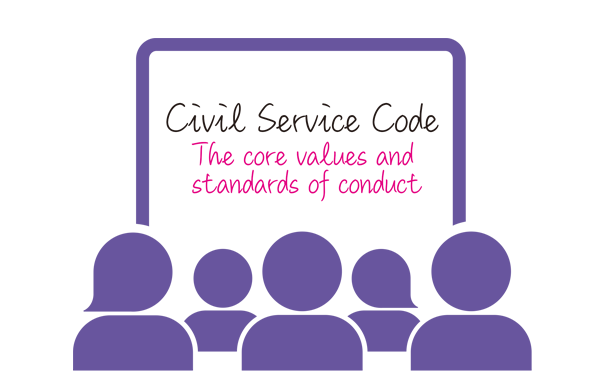
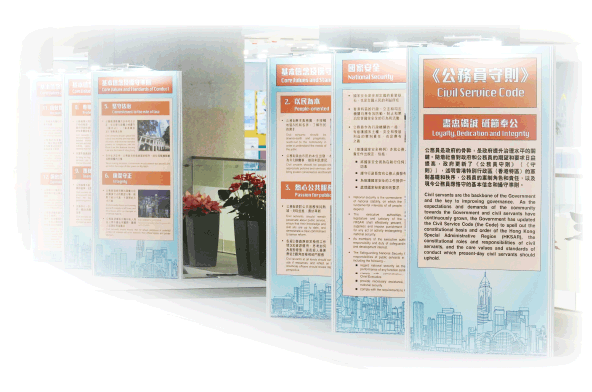
Mrs Yeung also shared her expectations on civil servants of the new era. They are expected to fully understand their constitutional responsibilities and roles, and perform their duties with professionalism.
“A civil service position is more than a job. A quality civil service is vital to enhancing the effectiveness of governance and, by dint of foresight, providing the public with services at the right time to meet their needs. The civil servants of the HKSAR are highly commended by the state leaders, and our civil service is a renowned one in the international arena. I am confident that as civil servants, our colleagues will continue to do their best in their roles in assisting with the formulation and implementation of policies, while upholding the guiding principles and professionalism, thereby enabling Hong Kong to capitalise on its strengths in the overall development of the country and ’One Country, Two Systems' to achieve greater success for the country and for Hong Kong,” she said.

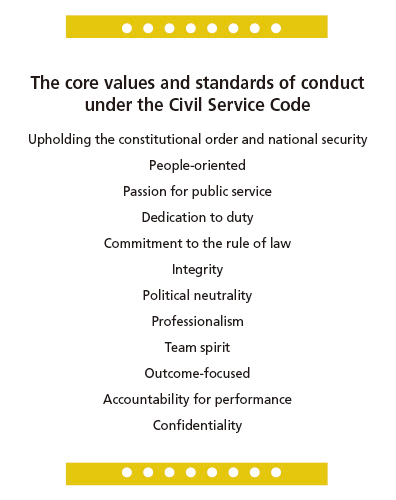
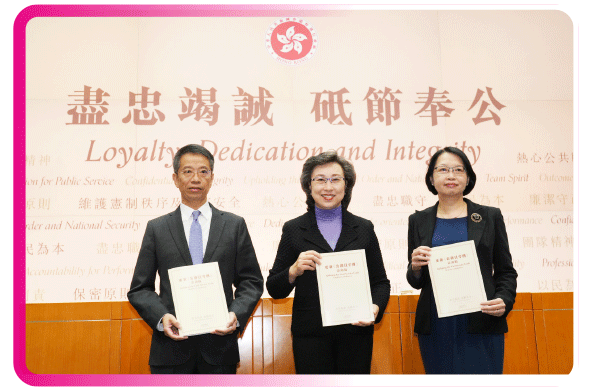
Mrs Yeung’s career in the public service has been closely intertwined with CSB. She has served the Government for more than 38 years, with over one-fifth in CSB during her tenure as the Deputy Secretary, the Permanent Secretary and, since July 2022 as the Secretary. She described CSB as a very special place having work purview over civil service policies, civil service grade management and case management.
Mrs Yeung said that to keep pace with changing society, CSB has undergone changes in the new era, with increasing workload in various areas, especially in the area of training which has become one of its priorities. “The former Civil Service Training and Development Institute was small in scale. By the time I rejoined CSB in 2020, efforts to strengthen civil service training had begun, and the Civil Service College was established thereafter in 2021, which reflects our awareness of the need to expand the scale of training work,” she said.
She admitted that after the black-clad violence in 2019 in Hong Kong, the public have higher and more specific expectations on civil servants. As a matter of fact, CSB has an important mission, which is to play an exemplary role for civil servants at large to provide quality public service.
Mrs Yeung said with a chuckle that over the years, CSB has introduced a host of policies and measures entailing changes to its systems, but what has remained unchanged is its efficient and well-established documentation and record-keeping system. “I am a bit surprised that CSB has maintained its high level of efficiency over the years. I have worked in a number of bureaux, and CSB is the best in terms of documentation and record-keeping. A big well done to CSB colleagues!” she added.
When asked about her unforgettable experience in the Government, Mrs Yeung said that she found it most unforgettable to have served as the Commissioner for Transport and the Permanent Secretary for Education because being the Head of Department (HoD) made her realise all the more that the civil service team is like a big machine, and its orderly operation requires concerted efforts and full cooperation from all parties. “The HoD functions like a driving force that keeps the machine going, and is ultimately held responsible for everything, big or small, that goes wrong, whether it be the situation of running out of fuel or missing a screw.”
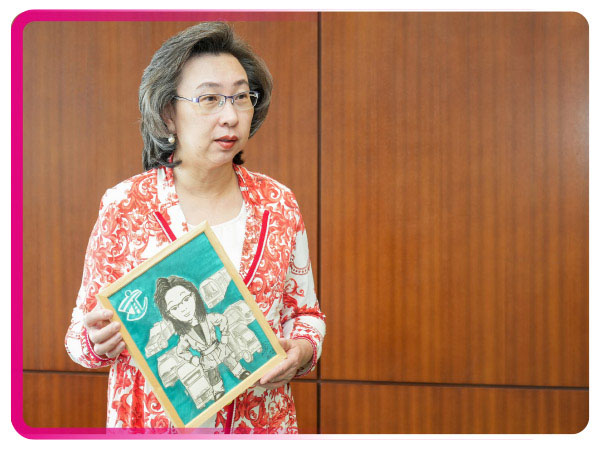
It is not always smooth sailing when it comes to introducing a policy. In her many years of work, there were times when Mrs Yeung had to promote policy initiatives that might not sound popular but were much needed by the community. For instance, to reduce the risk of human infections with avian influenza virus, it was necessary to slaughter chickens in Hong Kong and change the habit of consuming fresh chickens, and meanwhile promote biosecurity on local farms. She realised from the work that even when there seems to be no progress in your work, it is important to look ahead and look beyond the immediate difficulties standing in your way. “Sometimes what you are doing may not bear much fruit or even shows no sign of progress, but it may well be a small piece of the bigger puzzle, and as long as all of us put the pieces together bit by bit, we will see changes for the better.”
When asked about her stress management in the midst of her busy work schedule, Mrs Yeung said that while working hard is a must, she also enjoys family and social life in her spare time to keep a clear head and stay away from stress.